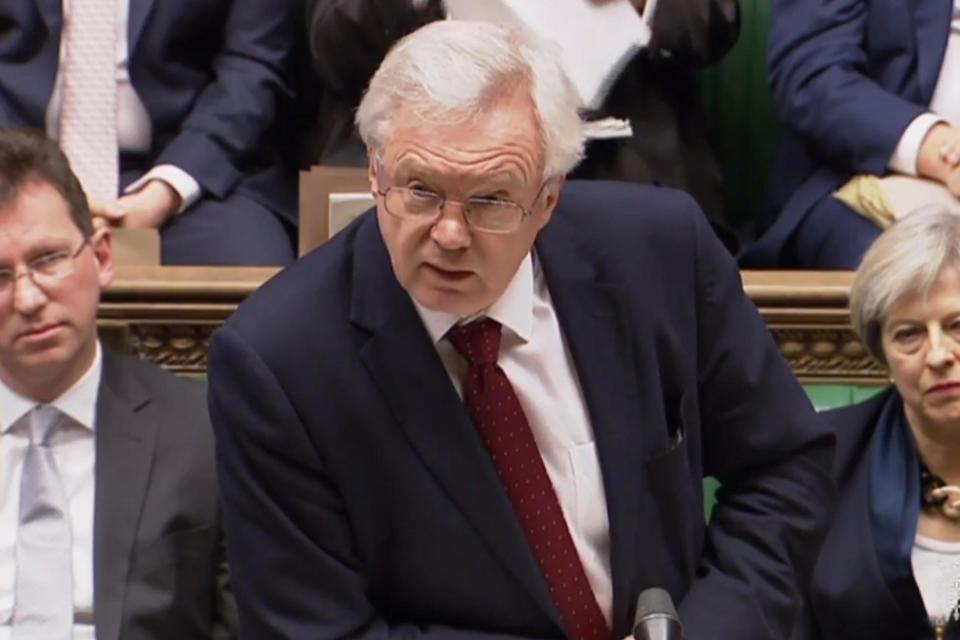ES Views: The mystery of Brexit is proving so hard to solve

Implying that Britain’s record high employment level is somehow linked to Brexit is an egregious example of post-truth spin [“Britain’s Brexit bonanza in jobs”, March 15].
It is indeed good news that the UK economy is still creating jobs but that is not surprising as we are still a full member of the EU. Much less encouraging is the fact that hundreds of thousands of people in low-paid jobs, part-time work and on zero-hour contracts are already being hit hard by increased inflation because of a weak pound thanks to the uncertainties of Brexit.
Who knows what will happen if Britain crashes out of the EU without the right deal? The Brexit Secretary David Davis, interestingly, admits that he doesn’t.
Jonathan Fryer, Lib-Dem Brexit spokesman for London
David Davis admits that the Government does not know what Brexit will do for Britain [“We haven’t assessed how a no-deal Brexit will affect Britain, Davis tells MPs”, March 15]. I am certain that he doesn’t know what sort of deal the other 27 countries in the EU might give us either.
I can tell him one thing: we have left a club which has agreed basic trading rules and we will not get a better deal when we are outside it. Davis is deluding himself if he thinks otherwise — even Boris Johnson can now see the looming reality of years of difficulty that lie ahead.
David Reed
Nick Clegg correctly spells out the future that extreme eurosceptic MPs are taking the country towards [“This Government is condemned to break its Brexit promises”, Comment, March 13]. I believe he has an even better understanding of the EU than our Brexit Secretary David Davis.
Not only will we jeopardise our trading relationship with the biggest market on our doorstep, we will also reduce our ability to expand our economy, as many vital and highly skilled EU employees return home feeling their situation will be jeopardised whatever the arrangements made in the coming negotiations.
Linda Green
A group of supposedly intelligent and highly-qualified lawyers, accountants and civil servants, led by the Chancellor, has beavered away for the past few months to produce a Budget that we rely on for fiscal security. A week later, a major part of that Budget was thrown out.
I admire a man who has the guts to correct his mistake (on National Insurance) but this was a self-inflicted blunder by a Government we are relying on to negotiate a good Brexit deal. If it can’t organise a Budget, how can we have any faith in their ability to negotiate when things get more serious?
Craig Alexander
£550k for a flat is not "affordable"
I read your article [“Spotlight on Willesden Green”, Homes and Property, March 15] and found the statement “affordable area of north-west London” laughable. How can the price of a two-bedroom flat quoted at £550,273 be “affordable”?
Up until a couple of years ago, I owned a three-bedroom home in a very affluent village in Hertfordshire. Yet the money I received from the sale could not even buy a two-bedroom flat in Willesden Green. I have always loved the area, having grown up there, but I find it frustrating that I am now priced out of purchasing a decent property there.
Ian Coward
The Scottish threat has lingered for years
The First Minister of Scotland Nicola Sturgeon is constantly bleating about the “hard Tory Brexit” being a massive threat to me and my generation, how we will be cast adrift and be buffeted by the winds of uncertainty.
However, I have spent years under the threat of a referendum on Scottish independence and all the economic, social and cultural uncertainty this has caused.
What seems more damaging: a decade of agitations, grievances and referendums by a secessionist movement that ignores the will of the Scottish population — or Brexit? In Scotland, the answer is obvious.
David Bone
Palace restoration: who should pay?
I am outraged by the SNP’s statement that says it is opposed to the costs of maintaining and repairing Buckingham Palace [“SNP to vote against Queen’s repair bill”, March 15]. Has it conveniently forgotten the cost of the Scottish Parliament Building at Holyrood?
At the beginning of works it was estimated to cost between £10-£40 million but ended up at £414 million. Not only was it 10 times over budget, it was delivered three years late and allegedly now costs the public purse £72 million a year in running costs.
This is nothing but sheer hypocrisy from the SNP.
Graeme Campbell
I am not Scottish but I agree with the SNP regarding Buckingham Palace’s restorations. It is a disgrace that the royal family, with their wealth and six other palaces, do not think of the people who are poor, homeless and have shrinking incomes. Why didn’t Labour vote against this?
Jenny Bushell
Join the conversation: #esnewsviews
We still like the dog track in Wimbledon
Sadiq Khan is effectively closing London’s last remaining greyhound track at Wimbledon on March 25 so that AFC Wimbledon can have a new stadium built alongside 600 flats — of which only nine per cent are classed as affordable housing.
The Mayor has said how great it will be for AFC Wimbledon to have a stadium in Merton, but by overlooking the views of Plough Lane residents who wanted a greyhound track, he is taking the moral low ground.
Richard Hill
Join the conversation: #essportviews

 Yahoo News
Yahoo News 